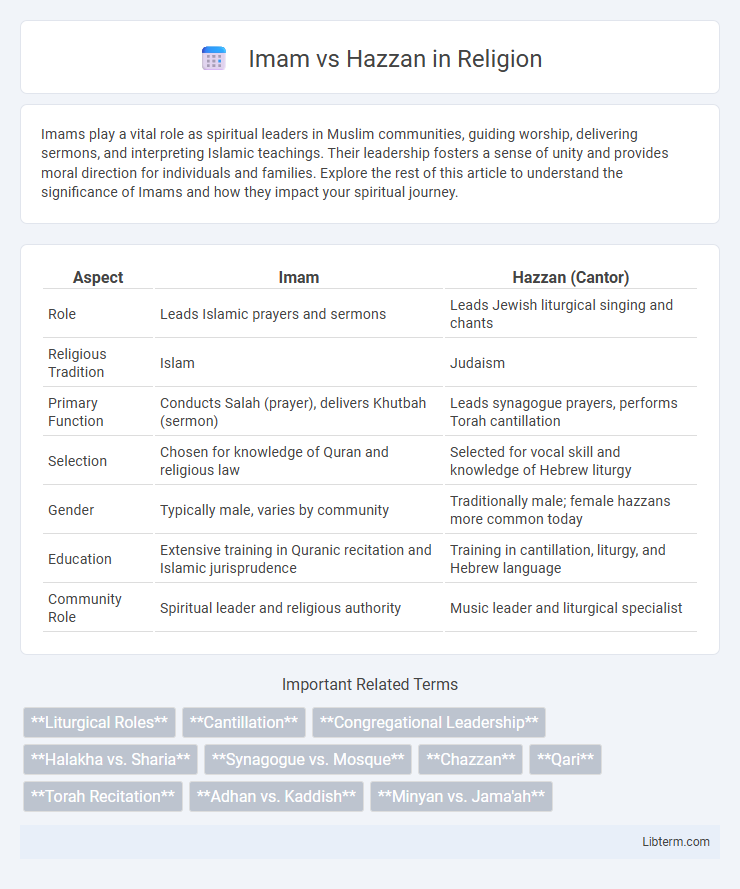Imams play a vital role as spiritual leaders in Muslim communities, guiding worship, delivering sermons, and interpreting Islamic teachings. Their leadership fosters a sense of unity and provides moral direction for individuals and families. Explore the rest of this article to understand the significance of Imams and how they impact your spiritual journey.
Table of Comparison
| Aspect | Imam | Hazzan (Cantor) |
|---|---|---|
| Role | Leads Islamic prayers and sermons | Leads Jewish liturgical singing and chants |
| Religious Tradition | Islam | Judaism |
| Primary Function | Conducts Salah (prayer), delivers Khutbah (sermon) | Leads synagogue prayers, performs Torah cantillation |
| Selection | Chosen for knowledge of Quran and religious law | Selected for vocal skill and knowledge of Hebrew liturgy |
| Gender | Typically male, varies by community | Traditionally male; female hazzans more common today |
| Education | Extensive training in Quranic recitation and Islamic jurisprudence | Training in cantillation, liturgy, and Hebrew language |
| Community Role | Spiritual leader and religious authority | Music leader and liturgical specialist |
Introduction: Understanding Religious Leaders
Imams in Islam serve as spiritual leaders who lead prayers, provide religious guidance, and interpret Islamic teachings for their communities, often holding roles beyond ritual leadership including community counseling. Hazzans, or cantors in Judaism, specialize in leading synagogue services through prayer chanting and liturgical singing, preserving traditional melodies and facilitating congregational participation. Both roles are pivotal in fostering religious devotion, though their functions and responsibilities differ according to distinct faith traditions and cultural contexts.
Defining Imam: Role in Islam
Imam serves as the religious leader in Islam, responsible for leading prayers, delivering sermons (khutbah), and guiding the Muslim community in spiritual and legal matters based on the Quran and Hadith. This role extends to providing religious education, interpreting Islamic law (Sharia), and offering personal guidance on faith and morality. Unlike the Hazzan, who specializes primarily in leading Jewish liturgical singing and chanting, the Imam's duties encompass broader religious, social, and judicial functions within the Islamic faith.
Who Is a Hazzan?
A Hazzan, also known as a cantor, is a Jewish musician trained in vocal music who leads the congregation in prayer through chanting and singing liturgical songs. Unlike an Imam, who serves as the religious leader and prayer leader in Islam, a Hazzan's primary role centers around enhancing spiritual connection through melodic expression in synagogue services. The Hazzan's expertise in traditional Jewish liturgy and music is essential for maintaining and preserving the cultural and religious heritage during worship.
Historical Origins of Imam and Hazzan
The Imam and Hazzan roles trace back to distinct religious traditions with unique historical origins. The Imam, central to Islamic worship, emerged in early Islamic communities as a leader guiding prayers and community matters, epitomizing spiritual and social authority. The Hazzan, or cantor in Judaism, originated in ancient synagogues, primarily responsible for chanting prayers and leading liturgical music, preserving Jewish oral traditions and religious ceremonies.
Spiritual Leadership: Imam vs Hazzan
Imams and Hazzans both serve as spiritual leaders, with Imams primarily guiding Islamic communities through prayer, religious interpretation, and community counseling, while Hazzans lead Jewish congregations in prayer and Torah cantillation with a focus on musical liturgy. The Imam often holds broader responsibilities including delivering sermons (khutbah), administering religious rites, and providing ethical guidance rooted in Islamic jurisprudence. Hazzans specialize in enhancing worship experiences through traditional chant and musical expertise, fostering spiritual elevation within synagogue services.
Duties and Responsibilities Compared
An Imam leads Islamic prayers, delivers sermons, and provides spiritual guidance within the Muslim community, emphasizing religious teachings and community leadership. A Hazzan, or Cantor, primarily leads Jewish liturgical music and chants prayers during synagogue services, focusing on musical and vocal aspects of worship. Both roles require deep religious knowledge, but the Imam's duties center on pastoral care and Islamic jurisprudence, while the Hazzan specializes in musical proficiency and maintaining liturgical tradition.
Worship Practices and Ritual Leadership
An Imam leads Islamic worship by delivering sermons, guiding prayers, and offering spiritual leadership within the mosque, emphasizing Quranic recitation and religious jurisprudence. A Hazzan, or cantor in Judaism, specializes in leading liturgical singing and chanting during synagogue services, enhancing communal worship through traditional melodies and prayers. Both roles embody ritual leadership but differ in their liturgical functions--Imams focus on doctrinal instruction and prayer direction, while Hazzans prioritize musical worship and synagogue chants.
Training and Qualifications Required
Imams typically require formal Islamic theological education, which can include study at a madrasa or Islamic university covering Quranic exegesis, hadith, jurisprudence, and Arabic language skills, often culminating in recognized certification or ordination. Hazzans, or cantors, generally undergo specialized training in liturgical chanting, Hebrew liturgy, and musical skills at institutions like a cantorial school or yeshiva, earning credentials such as investiture or certification from recognized Jewish religious authorities. Both roles demand continuous education and spiritual leadership qualities, but Imams focus on comprehensive religious jurisprudence while Hazzans specialize in musical and liturgical expertise.
Community Influence and Social Functions
Imams serve as religious leaders in Muslim communities, providing spiritual guidance, leading prayers, and delivering sermons that address social issues and moral development. Hazzans (cantors) in Jewish communities lead liturgical music and chants during worship, fostering communal cohesion through shared traditions and enhancing the spiritual experience. Both roles significantly influence community identity by promoting religious education, moral values, and social solidarity within their respective faith groups.
Imam and Hazzan: Bridging Faith and Tradition
The Imam and Hazzan both play pivotal roles in Islamic and Jewish worship, respectively, each embodying the spiritual leadership and tradition of their faiths. The Imam leads prayers, offers sermons, and provides religious guidance within the Muslim community, serving as a crucial figure in interpreting Islamic teachings. The Hazzan, or cantor, enhances Jewish worship by chanting prayers and leading the congregation in song, preserving the melodic and liturgical traditions central to Jewish religious practice.
Imam Infographic

 libterm.com
libterm.com